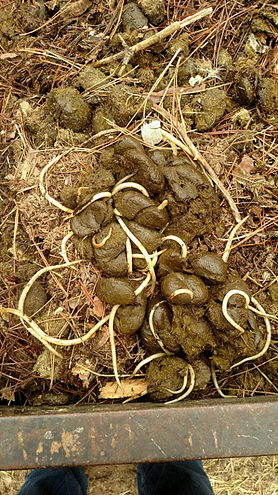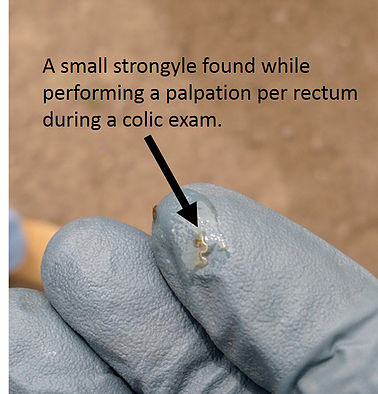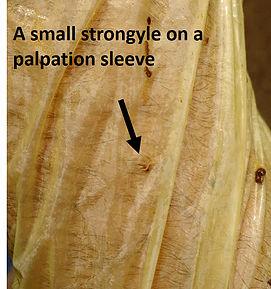 The way it used to be:
The way it used to be:
What is Strategic Deworming?
Strategic Deworming involves determining a Fecal Egg Count (FEC) by counting the number of parasite eggs, and using that number, along with the specific identification of which types of parasites are present, to better select a dewormer. Only about 20% of horses harbor about 80% of parasites, so the same deworming program shouldn’t be used for all horses.
Goals of Strategic Deworming:
-
Tailor deworming to the individual horse, time of year, geographic location, and exposure level. This means using the right dewormer, at an effective dose, at the best times.
-
Limit overuse of dewormers to prevent resistance. Resistance can be present regionally or more locally on specific farms.
-
Evaluate a dewormer’s effectiveness on a certain farm by checking a fecal before and after deworming.
-
The goal is NOT to eradicate all the parasites or to make every horse into a “low shedder”.

Manure management:
Parasites are part of the normal intestinal fauna of grazing animals: horses and parasites evolved together. Actively managing horses (fences etc) causes an imbalance to this relationship.
-
By far the best parasite management practice is to remove manure frequently from pastures and pens
-
Compost manure before spreading on grazing areas.
-
Pay particular attention to remove manure from feeding areas.
-
Avoid overcrowding
-
-
Deworm new horses prior to introduction, and keep visitors separated.
-
Mowing and harrowing pastures: this exposes eggs and larvae to the killing effects of air and sunlight. Works best when temperatures are at least 85°F.
-
Rotational grazing: allows larval stages to die before horses are exposed. Ideally combine rotational grazing with mowing/harrowing.
General recommendations for adult horses:
Discuss with your veterinarian if the below protocol is a good fit for your horses. Many factors influence a deworming program including manure management, animal density, and general health of the horses. Please wait at least 4 weeks after most recent deworming to submit a sample for a fecal egg count.
SPRING: Check a fecal egg count
-
Low shedder (<200 epg): deworm with ivermectin
-
Moderate shedder (200-500 epg): deworm with ivermectin and recheck fecal in 4 weeks
-
High shedder (>500 epg): deworm with ivermectin now and repeat in 4 weeks, then recheck fecal 4 weeks after second deworming.
FALL: Check a fecal egg count
-
Low shedder (<200 epg): deworm with ivermectin and praziquantel combination
-
Moderate shedder (200-500): deworm with ivermectin and praziquantel combination and recheck fecal in 4 weeks
-
High shedder (>500 epg): deworm with ivermectin and praziquantel combination then deworm with ivermectin (no praziquantel). Recheck fecal in 4 weeks. If continues to be high, deworm with moxidectin.
-
If a horse is showing overt symptoms of intestinal parasitic disease, perform a fecal egg count and discuss a deworming protocol with your veterinarian. Moxidectin may be recommended to kill encysted larvae in these horses.
Tapeworms:
Praziquantel is used to treat for tapeworms. Tapeworms do not show well on a standard fecal; however, in this area deworming with praziquantel once yearly is typically adequate. Praziquantel is included with ivermectin in EquiMax (recommended) and Zimectrin Gold. Praziquantel is included with moxidectin in QuestPlus.
For horses less than three years old:
-
If you acquired a horse less than 3 years old and it has no deworming history, please consult a veterinarian prior to deworming them for the first time. These horses should have an individualized plan for deworming. If a young horse contains a large number of parasites, they may be at risk for a severe impaction colic caused by die-off of ascarid parasites. This could require surgery and can even cause death.
-
Foals should receive at least 4 deworming treatments within their first year of life.
-
@ 2-3 months old, deworm with oxibendazole
-
@ 4-6 months old, deworm with oxibendazole
-
@ 9 months, deworm with an ivermectin and praziquantel combination
-
@ 12 months, check a fecal and deworm with either ivermectin or oxibendazole depending on the predominant parasite type seen.
-
 How do I submit a manure sample for a fecal egg count?
How do I submit a manure sample for a fecal egg count?
It’s easy! All we need is 1-2 fresh fecal balls per horse. If possible, try to collect from the center of a manure pile so they are not dried out or covered in bedding, sand, or dirt. Place into a clean zip-lock bag and label with your first and last name, horse’s name, and date of collection. If you have a rough idea of when the horse was last dewormed and what product was used, that is helpful information for formulating a deworming program best suited to your horse. Keep the sample in the fridge or in a cooler with ice packs until it gets to us. You can drop off samples at any of our three locations (Lodi, DeForest, or Portage); give it to us at your next appointment; or call to arrange pick-up.
Please don’t hesitate to call with any questions or to discuss a deworming protocol specific to your horse!

